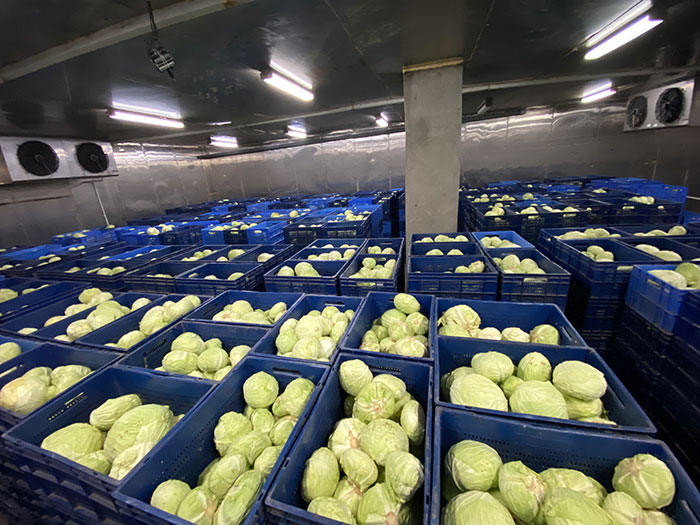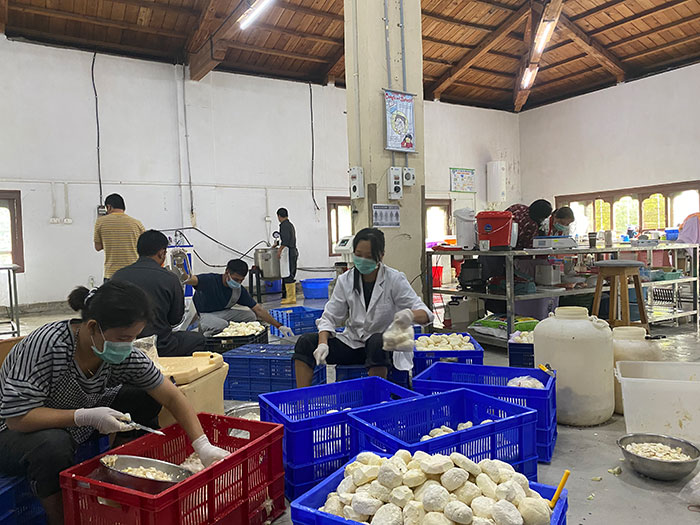Phub Dem | Paro
If there is a perfect word to describe the National Post Harvest Centre (NPHC) in Paro, it is ‘science experiment class’.
The other day the centre was experimenting with fresh cabbage and chili. Yesterday, it was fermented cheese.
The stench smell of cabbages and rotten cheese is unbearable even when you are covered with a facemask.
After lockdown, the staff of NPHC got busy like never before. If it weren’t for the NPHC, the surplus produce would have ended up in dumping yards.
The centre has initiated vegetable preservation in cold warehouses and preserved it in the form of diverse products.
With the restriction in exports and limited domestic market, tonnes of cabbages rot in the field.
The Ministry of Agriculture and Forests in coordination with the centre has explored ways to process the perishables.
Although the centre tried diversification of the cabbage earlier, it gained momentum only recently due to the pandemic.

About 60MT of cabbages arrived at the NPHC
NPHC’s programme director, Dechen Tshering, said that there was no issue with product development but was sceptical about how the consumers would respond to the new products. “Dried cabbage will be the first new product in the market, for example. If the trial is successful, we will encourage the enterprises to take up the venture.”
The picture of what can cabbage become in times of the pandemic—dried cabbage, powdered cabbage for soups, kimchi, and sauerkraut pickles.
While the centre is engaged in small-scale production, which includes cold storage of about 60 metric tonnes (MT), the whole affair is labour intensive.
He said that the post-harvest venture was capital intensive and required investment in machines and technology.
Dechen Tshering said that the plan was to build and transfer the machines to big processing plants and encourage private individuals to take up the processing work.
The centre, established in 1997, has a variety of products ranging from frozen food, flour, dried and powdered products, spices, jam, juice and jelly, among others.
NPHC serves as a training and research centre. It is mandated to conduct feasibility studies, recommend appropriate technical measures and support the establishment of post-production infrastructure such as packhouse equipped with handling, grading, packaging, equipment and food processing plant, among others, through public-private partnership.
It also promotes cheap household post-production infrastructure to minimise food loss. Annually, the centre trains about a thousand farmers to value-add various products.
Although the centre has been focusing on vegetables, it has begun preserving livestock products such as cheese.
The centre received 200 kilograms of surplus cheese from Bhutan Livestock Development Corporation two days ago.
NPHC has been helping preserve surplus cheese. “The centre had been trying every possible way to help reduce loss to the farmers and the government,” Dechen Tshering said.
Paro’s dzongkhag agriculture officer, Tandin, said that with limited demand for vegetables, especially cabbages from the Food Corporation of Bhutan and Centenary Farmers Market, selling cabbage was a major challenge.
In consultation with the agriculture ministry and NPHC, tonnes of cabbage from Paro were sent for cold storage and preservation.
Tandin said that FCB and the dzongkhag agriculture office dumped truckloads of rotten cabbage. “We even tried preparing manure from the rotten cabbage.”
The Paro dzongkhag agriculture office recorded cabbage buyback worth Nu 20M.


